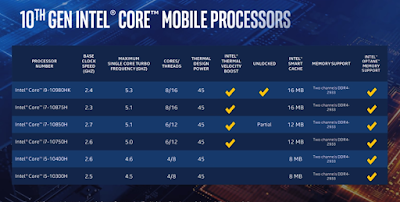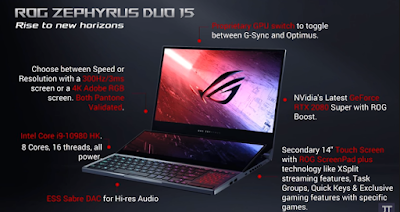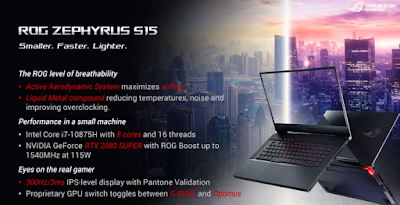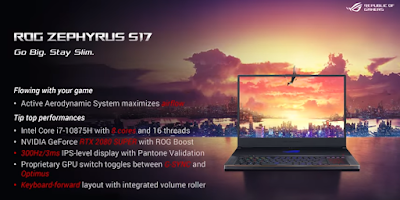ASUS is refreshing their gaming laptop lineup with the launch of Intel’s new 10th gen processors and Nvidia’s Supergraphics.
Let’s Know About the new models and find out what’s coming.
These are the new Nvidia Super graphics that we’re going to get, so 2070 and 2080 Super. Outside of Super, there are also some improvements from Nvidia such as dynamic boost and advanced Optimus.

Let’s start out with the ASUS Zephyrus Duo 15 because I thought it was the most interesting laptop out of the new machines. The idea behind this one is combining the best of both worlds from the Zephyrus lineup and the ZenBook Pro Duo, the laptop with two screens.
What we get is a gaming laptop with a second screen. The lower screen folds up automatically when you open the lid of the machine. A comment a lot of people left on my review of the Pro Duo was that they’d want the screen to be angled more so it’s easier to see, and from these initial images, it looks like that may be the case. The secondary 14” 60Hz touch screen is apparently the same panel we saw in the Pro Duo. ASUS says they are working with various game developers so that different titles will better support this two-screen setup.
If you recall from previous Zephyrus laptops, like the GX701, the back half above the keyboard is just all air intake vents and otherwise unused. The Duo 15 will pull air in below the second screen, and the gap is wider than the older hinge lift design so in theory better cooling, plus you of course also get the advantage of the extra screen real estate.
As for the rest of the specs, the Duo 15 will be available with up to the 8 core Intel i9-10980HK processor and Nvidia RTX 2080 Super Max-Q graphics, quite the mouth full there. It will be available with either a 1080p 300Hz screen or 4K I’m guessing 60Hz but it wasn’t specified.
 I’m assuming this is the new Nvidia advanced Optimus feature but wasn’t able to confirm if it is or just a standard MUX switch that needs a reboot. Speaking of top-end options, ASUS were asked if they’d be refreshing the mothership, they weren’t able to say at the moment, it sounds like they’re still considering it. ASUS said that all of their new 10th gen laptops, excluding the TUF F15 and F17, will use thermal grizzly conductonaut, so liquid metal, which is honestly pretty awesome and should greatly improve thermals. While cool, it really makes you wonder if the Intel 10th gen processors are just so hot that this has now become required, but I guess we’ll see when they arrive for testing.
I’m assuming this is the new Nvidia advanced Optimus feature but wasn’t able to confirm if it is or just a standard MUX switch that needs a reboot. Speaking of top-end options, ASUS were asked if they’d be refreshing the mothership, they weren’t able to say at the moment, it sounds like they’re still considering it. ASUS said that all of their new 10th gen laptops, excluding the TUF F15 and F17, will use thermal grizzly conductonaut, so liquid metal, which is honestly pretty awesome and should greatly improve thermals. While cool, it really makes you wonder if the Intel 10th gen processors are just so hot that this has now become required, but I guess we’ll see when they arrive for testing.ASUS said they perfected liquid metal application by machine with the Mothership and were able to expand this process to this new generation, as an application by hand simply isn’t scalable.
Asus Rog Zephyrus S15 & S17:
Now let’s move onto the GX502 and GX701, these are 15 and 17-inch machines respectively, however, they’re being renamed to the Zephyrus S 15 and Zephyrus S 17. From what I can tell the design appears similar if not the same.
Again both have liquid metal cooling, type-c charging and interestingly Thunderbolt 3, which they were missing the last generation. The Intel 10th gen CPU will go up to the 8 core i7-10875H and Nvidia RTX 2080 Super Max-Q graphics at the top end.
Asus Rog Zephyrus S17
It will still get Thunderbolt 3, Type-C charging, however no switch to disable Optimus here as was the case with the earlier models. There are some different lid options available that have a subtle color change effect.
Asus Rog Strix Scar 15 & 17
They do however offer three M.2 slots for storage if I recall last gen there was just one and a 2.5” drive bay. They also make use of keystone version 2, though it wasn’t too clear what benefits that provides compared to last gen.
Asus Rog Strix G15 & 17
 ASUS seems to be getting on board with faster M.2 storage and offering plenty of slots for it. ASUS is listing a number of their laptops with DDR4-3200 memory, however, the Intel 10th gen officially supports DDR4-2933, it’s not currently clear if higher is possible with XMP profiles or if you require memory that supports 3200 with JEDEC, I’ll test that out when I have some.
ASUS seems to be getting on board with faster M.2 storage and offering plenty of slots for it. ASUS is listing a number of their laptops with DDR4-3200 memory, however, the Intel 10th gen officially supports DDR4-2933, it’s not currently clear if higher is possible with XMP profiles or if you require memory that supports 3200 with JEDEC, I’ll test that out when I have some.On the AMD side, there’s, of course, the new Zephyrus G14 which I’ve previously reviewed in-depth, and the G15 which is basically a newer version of the popular GA502, and is also Ryzen based. A lot of you have asked if I’ll be testing this lately, I expect so, but don’t currently have an ETA, it depends on when ASUS have review units available in my country so I’m waiting to hear back on that.
We saw in my CES coverage that there are the TUF A15 and A17 gaming laptops which are also Ryzen based, again still waiting to get my hands on those,
 however, I’ve got some more information on the TUF F15 and F17, which are the Intel 10th gen versions of the A15 and A17. Basically, they’re only going to be available in China and Taiwan, at least initially, so for most of the world we’re only getting the Ryzen versions of the TUF laptops, but honestly based on the performance I’ve seen so far that’s ok with me.
however, I’ve got some more information on the TUF F15 and F17, which are the Intel 10th gen versions of the A15 and A17. Basically, they’re only going to be available in China and Taiwan, at least initially, so for most of the world we’re only getting the Ryzen versions of the TUF laptops, but honestly based on the performance I’ve seen so far that’s ok with me.ASUS mentioned that these would be the only Ryzen based models at this time, as it requires a redesign of the motherboard and thermals, so maybe they’ll have more options in the future, but for now, it looks like their higher-end gaming laptops will primarily be Intel-based.
Given the outstanding processor performance from the 4900HS in the G14, I found it a little strange that they haven’t also gone for, say a Ryzen based Scar or Zephyrus model, but at the same time, I think they also currently have the most Ryzen 4000 gaming laptops available, other companies are still lacking much more in that regard. So the key takeaways seem to be that everything has undergone a name change. Most of the lineup is being refreshed with Intel 10th gen and Nvidia Supergraphics. Thunderbolt 3 has made its way into the Zephyrus models, and liquid metal is present in almost all of their 10th gen laptops.
A few of the models like the Scar and Strix have moved to three M.2 slots for expanded solid-state storage, otherwise, Ryzen processors will only be available in the G14, G15, TUF A15, and A17, as originally covered at CES in January.
Let me know which models you’re most interested in down in the comments.
By - Ifti Ahmed




















Post a Comment